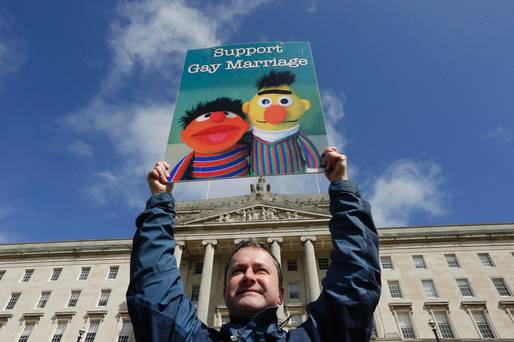By Kevin Henry
The vote for marriage equality in the South is an important point of inspiration in the fight for equality here. Many will also be disappointed that, once again, Northern Ireland is being left behind when it comes to LGBT rights, as well as women’s rights, while racist attacks increase and sectarian division continues to pervade society.
DUP: Block on progress
People quite correctly point to the DUP as a key part of the problem, using petitions of concern to block progress on marriage equality. This party has a long and sordid history of opposing equality, with many prominent members making disgusting homophobic comments. In 1977, Paisley led the Save Ulster From Sodomy campaign which opposed the decriminalisation of homosexuality. Today, DUP Health Ministers have used public funds to maintain a ban on gay men giving blood in opposition to medical and legal opinion while the party is pushing for a “conscience clause” which would enshrine business’s right to discriminate against the LGBT community into law.
The resignation of Jim Wells as Health Minister, however, shows that they are not immune from public pressure. Wells was forced to resign because of widespread revulsion at his comments. He was replaced by Simon Hamilton, who the press tried to portray as a “moderniser.” This is very far from true. Hamilton is a member of the Caleb Foundation, set up in 2009 to promote law and government in line with Biblical doctrine, which among other things has called for Pride parades to be banned! However, Hamilton will tread carefully precisely because of how is predecessor was forced to resign.
But they aren’t alone…
The DUP are far from the only “homophobes in the village.” Only one UUP MLA voted for marriage equality while leading SDLP and Alliance members either abstained or failed to show up for the vote. In reality, those who abstained are opposed to gay rights but too cowardly to admit it. You can’t be neutral on this question – you either support people’s rights or support the status quo of discrimination. Sinn Fein like to boast about their credentials of supporting the LGBTQ community but what has been done by successive Sinn Fein Education Ministers to challenge homophobic bullying in schools or stop homophobic organisations preaching their bigotry as part of sex education programmes?
All the political parties in the Executive are united in their opposition to a woman’s right to choose. During the negotiation of the Good Friday Agreement, they jointly lobbied the British government not to extend the 1967 Abortion Act to Northern Ireland. The words of Coretta Scott King sum up the attitude we need to adopt to those parties who support marriage equality but oppose abortion rights: “Freedom and justice cannot be parcelled out in pieces to suit political convenience. I don’t believe you can stand for freedom for one group of people and deny it to others.”
Fighting Sectarianism
The underlying reason for Stormont’s backwardness is sectarian division. The legacy of the Troubles means that politics here is dominated by Orange and Green and elections are reduced to little more than a sectarian headcount. Thus, people can feel pressured to vote for parties who are unrepresentative of their views on many issues against “the other side”. For example, Jim Wells was accused of harassing a lesbian couple while canvassing shortly before his resignation – one was a life-long DUP voter!
It is, therefore, extremely important that issues of equality are not allowed to be turned into a sectarian game. A glimpse of this can be seen in Gerry Adams’ comments last year describing equality was the ‘Trojan horse’ of the republican strategy. These comments sectarianise debate around equality issues and have been used by the DUP any time LGBT equality is discussed. If it is left to sectarian forces, the fight against inequality cannot be won.
There has been an important shift in social attitudes in the North. For example, the number of people who believed that gay and lesbian relations are “always wrong” in 1989 was 76%. By 2012, it had dropped to 28%. These shifts in attitude should give confidence to people who want to fight for equality. In Northern Ireland, we have a population moving in progressive direction and a political establishment that is increasingly out of touch. We cannot wait for change to come from the politicians. We need to build a powerful movement that has confidence in working class and young people from both communities to win these rights.
Referendum: A way forward?
In the LGBT movement, there has been some discussion about the best way to win marriage equality. Inspired by events in the South, some have called for a referendum on the issue while many oppose this route and prefer to rely upon a judicial review. These are important questions but they are ultimately secondary to building a mass movement that can exert the necessary pressure. There is, of course, a history of victories for LGBT rights in the courts – the decriminalisation of homosexuality and the recent Asher’s Bakery case, for example.
However, it is mistaken to simply believe that “the High Court and Strasbourg will once again be the agents for change”, as UUP councillor Jeff Dudgeon – who took the case on decriminalisation of homosexuality – recently claimed. These courts more often find against the interests of ordinary people than for them. For example, the European Court of Justice recently ruled that bans on gay men giving blood are permissible in some circumstances while the courts have denied women from Northern Ireland access to free abortions through the NHS in Britain.
One of the criticisms of the idea of a referendum is that people should not have to beg others for basic rights. The Socialist Party completely agrees with this sentiment. We are opposed to coercion of minorities in any form and believe that the right to marry is one which no one should be denied. However, the reality is that some group of people will have the say on marriage equality – either the 108 MLAs at Stormont or a judge. Ordinary people are much more progressive in their attitudes than either of these groups. It is a tactical questions as to whether a referendum (which would not be binding) could be used as a way to exert pressure through public opinion, particularly on the politicians.
Building a movement to win
No matter what route marriage equality is achieved through, the “agents for change” will be ordinary working class people and particularly young people fed up with the conservative establishment. As Harvey Milk – a prominent LGBT leader in the 1960s – observed, “Rights are won only by those who make their voices heard.” History has shown these rights can won even against a conservative establishment. Abortion rights in America were won in the 1970s against the backdrop of the conservative Nixon administration. Why? Because a strong women’s movement was built and this movement was linked with other mass movements, against the war, against racism and for workers’ rights. The same powerful synergy of movements have been seen time and again in history. The film ‘Pride’ shows how LGBT groups linking up in solidarity with striking miners because they saw a common enemy in Thatcher. The film also shows how the experience transformed the outlook of many miners towards the LGBT community, with the National Union of Mineworkers leading the trade union movement to support abolition of Article 28, which imposed a higher age of consent on same-sex couples.
All these struggles, at their heart, challenge the capitalist system which bases itself on dividing and oppressing people. We cannot solely confine ourselves to winning legal reforms but must seek to transform society. It’s not enough that a woman formally has the right to abortion but can’t afford one because she is denied access to public healthcare. It’s not enough that gay couples can get married but, across Europe, two-thirds are scared to hold hands in public. This system, while able to grant concessions when faced with mass pressure, will claw them back when it can. This is what we are seeing with constant attacks on women’s right to choose across the world. Ultimately, to end oppression and guarantee rights we need to fight to end this system. This requires building a new mass Left in society, based on uniting working class people and fighting for equality. Such a force must not shying away from struggling for a socialist society based on solidarity and respect which will allow people to live free of oppression in all its forms.












